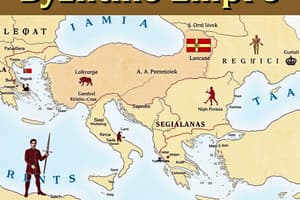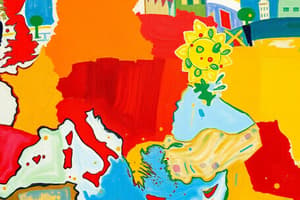Podcast
Questions and Answers
What was the primary reason for the establishment of Constantinople as the new capital of the Roman Empire?
What was the primary reason for the establishment of Constantinople as the new capital of the Roman Empire?
- To symbolize the rise of the Byzantine Empire after the fall of Rome.
- To mark a religious shift from paganism to Christianity.
- To enhance trade routes and military defense capabilities. (correct)
- To create a new cultural identity separate from Rome.
Which language transitioned to become the primary mode of communication in the Byzantine Empire?
Which language transitioned to become the primary mode of communication in the Byzantine Empire?
- Aramaic
- Greek (correct)
- Arabic
- Latin
How did people living in the Byzantine Empire perceive their identity following the establishment of Constantinople?
How did people living in the Byzantine Empire perceive their identity following the establishment of Constantinople?
- They considered themselves as inhabitants of a new civilization.
- They identified primarily with the Greek culture alone.
- They believed they were the legitimate continuation of the Roman Empire. (correct)
- They saw themselves as distinct from the Romans.
During what period did Constantine rule the entire Roman Empire?
During what period did Constantine rule the entire Roman Empire?
What was one common misconception about the period following the fall of Rome?
What was one common misconception about the period following the fall of Rome?
What significant construction is attributed to Justinian during his reign?
What significant construction is attributed to Justinian during his reign?
What impact did Emperor Heraclius have on the official language of the empire?
What impact did Emperor Heraclius have on the official language of the empire?
Which factor contributed to Leo VI's unique approach to power during his reign?
Which factor contributed to Leo VI's unique approach to power during his reign?
What was one notable consequence of Leo VI's concentration of power?
What was one notable consequence of Leo VI's concentration of power?
What was one of Emperor Heraclius's notable achievements in combating corruption?
What was one of Emperor Heraclius's notable achievements in combating corruption?
What significant geographical advantage did Constantinople possess over Rome?
What significant geographical advantage did Constantinople possess over Rome?
Which emperor is credited with marking the height of the Byzantine Empire's power?
Which emperor is credited with marking the height of the Byzantine Empire's power?
What was one reason for the division of the Roman Empire into eastern and western halves?
What was one reason for the division of the Roman Empire into eastern and western halves?
What architectural achievement in Constantinople is often cited as an example of its grandeur?
What architectural achievement in Constantinople is often cited as an example of its grandeur?
Which of the following factors contributed to the decline of Rome compared to Constantinople?
Which of the following factors contributed to the decline of Rome compared to Constantinople?
How did the fall of Constantinople influence the Renaissance in Western Europe?
How did the fall of Constantinople influence the Renaissance in Western Europe?
What was a strategic military action taken by Justinian during his reign?
What was a strategic military action taken by Justinian during his reign?
What was a significant aspect of the social structure in the Byzantine Empire compared to Western Europe?
What was a significant aspect of the social structure in the Byzantine Empire compared to Western Europe?
Which of the following statements is true regarding the rulers of the Byzantine Empire?
Which of the following statements is true regarding the rulers of the Byzantine Empire?
What was the reason for the decline of the Byzantine Empire over the centuries?
What was the reason for the decline of the Byzantine Empire over the centuries?
What event did Theodora influence during her husband's reign?
What event did Theodora influence during her husband's reign?
What is the Codex Justinianus primarily known for?
What is the Codex Justinianus primarily known for?
What characterized the early years of the Byzantine Empire?
What characterized the early years of the Byzantine Empire?
How did the social structure of the Byzantine Empire evolve over time?
How did the social structure of the Byzantine Empire evolve over time?
What personal background did Emperor Justinian have before becoming emperor?
What personal background did Emperor Justinian have before becoming emperor?
What aspect distinguished the Byzantine Empire's approach to leadership?
What aspect distinguished the Byzantine Empire's approach to leadership?
Why is the late Byzantine Empire compared to the early days of the Roman Empire?
Why is the late Byzantine Empire compared to the early days of the Roman Empire?
Flashcards
The Dark Ages
The Dark Ages
The period following the decline of the Western Roman Empire, often mischaracterized as a time of darkness and ignorance.
Constantinople
Constantinople
The city of Constantinople, founded by Roman Emperor Constantine in 330 CE, later became the capital of the Byzantine Empire.
The Rise of Constantinople
The Rise of Constantinople
The shift of power from Rome to Constantinople, marking a significant change in the political and cultural landscape of Europe.
Byzantium
Byzantium
Signup and view all the flashcards
The Byzantines
The Byzantines
Signup and view all the flashcards
Rise of Constantinople
Rise of Constantinople
Signup and view all the flashcards
Division of the Roman Empire
Division of the Roman Empire
Signup and view all the flashcards
Byzantine Expansion
Byzantine Expansion
Signup and view all the flashcards
Byzantine Strength
Byzantine Strength
Signup and view all the flashcards
Justinian's Reign
Justinian's Reign
Signup and view all the flashcards
Byzantine Legacy
Byzantine Legacy
Signup and view all the flashcards
Hagia Sophia
Hagia Sophia
Signup and view all the flashcards
Feudalism
Feudalism
Signup and view all the flashcards
Social Rigidity
Social Rigidity
Signup and view all the flashcards
Stagnation
Stagnation
Signup and view all the flashcards
Meritocracy
Meritocracy
Signup and view all the flashcards
Golden Age of Byzantium
Golden Age of Byzantium
Signup and view all the flashcards
Decline of Byzantium
Decline of Byzantium
Signup and view all the flashcards
Justinian's Code
Justinian's Code
Signup and view all the flashcards
Empress Theodora
Empress Theodora
Signup and view all the flashcards
Emperor Justinian
Emperor Justinian
Signup and view all the flashcards
Theodora & Justinian's Legacy
Theodora & Justinian's Legacy
Signup and view all the flashcards
Heraclius: Greek Language & Military
Heraclius: Greek Language & Military
Signup and view all the flashcards
Leo VI's Scholarly Approach to Power
Leo VI's Scholarly Approach to Power
Signup and view all the flashcards
Centralized Power and Leo VI
Centralized Power and Leo VI
Signup and view all the flashcards
Leo VI's Legacy: History & Adaptation
Leo VI's Legacy: History & Adaptation
Signup and view all the flashcards
Study Notes
Chapter 2 - Stewards of the Future - The Rise of the Byzantine Empire
- The fall of Rome is often viewed as the end of a golden age, a period of philosophical exploration and human nature.
- The period following the fall of Rome, from the 5th to the 13th centuries, is not a "Dark Age;" rather, it was a period of transition.
- The daily lives of most people in the continent weren't significantly changed by the fall of Rome.
- The fall mainly affected those who held power in the Roman Empire.
- Knowledge and brilliance from the Roman Empire didn't disappear completely.
The Founding of the Future Rome
- The Byzantine Empire considered itself a continuation of the Roman Empire, differing primarily by location (region).
- It was more of a transition than a complete break from the Roman Empire, with Constantinople as the new central authority.
- The language shifted from Latin to Greek.
- Constantinople was founded by Emperor Constantine in 330 CE as New Rome, later renamed Constantinople.
- Constantine moved the capital from Rome to Constantinople.
- Constantinople's strategic location between Europe and Asia, along with natural defenses and access to a harbor, made it a thriving center of trade and communication.
Progress
- The Renaissance was influenced by the knowledge and teachings of those who left Constantinople after it fell to the Ottoman Empire.
- The Byzantine Empire built upon Roman ideas and philosophies.
- Constantinople featured magnificent buildings like Hagia Sophia.
- The Byzantine Empire had a unique social structure, differing from the social rigidities emerging in Europe.
Leaders Who Sustained and Surpassed Rome
- Emperor Justinian and Empress Theodora were instrumental in shaping the Byzantine Empire's course.
- They were born to lower-class families and worked through their careers to ascend to power.
- Justinian and Theodora faced internal conflicts and wars, which they resolved.
- Justinian had their laws compiled and implemented as the Codex Justinianus, which served as a foundation for future legal systems.
Seeds of the Renaissance
- The Byzantine Empire extended and maintained Roman ideas and power.
- Despite falling to the Ottoman Empire, Constantinople survived for centuries and influenced the development of European intellectual and artistic thought.
- Its preservation of Roman knowledge and principles made it a significant part of the transition to the Renaissance.
Studying That Suits You
Use AI to generate personalized quizzes and flashcards to suit your learning preferences.




